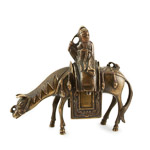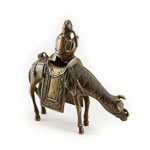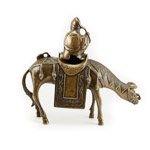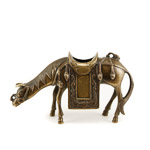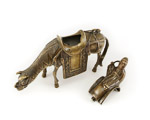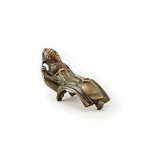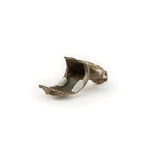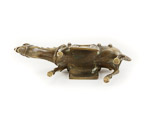
Antiques & 20th Century Collectables
Chinese Incense Burner of Poet Du Fu riding his Mule
Chinese Bronze Censer
Censer in form of Du Fu riding his mule
Antique Chinese bronze figural incense burner (censer) of Tang Dynasty Poet Du Fu 杜甫 (712-770) riding side saddle on his caparisoned mule; with provenance. Two piece cast bronze censer with hand chased finishing, the incense burner body cast, with hollow body for burning incense, as a long pointed eared mule standing with its head outstretched towards the ground and in traditional Chinese harness and cloth saddle. The detachable figural cover cast as bearded poet Du Fu wearing long robes and a scholars cap and holding either the ribbon of his scholars cap or perhaps a simple ruyi sceptre.
Qing dynasty, 19th century or earlier provincial bronze alloy composition with copper filled casting plugs. Traces of original cold painted brown pigment applied to detail remain around mules eyes and parts of the harness and saddle. The saddle having cast details of two dragons chasing pearls of wisdom and Chinese WAN symbol.
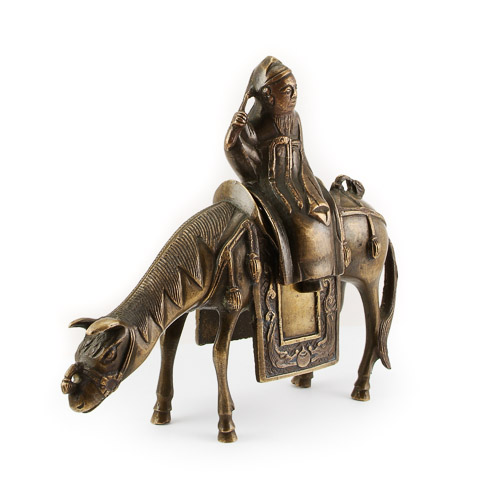
Typically for a Chinese bronze censer of this age, much of remaining bronze was left natural/unpatinated and the patina now is a desirable hard won natural aged bronze patina developed over the centuries. In regular use the bronze has rubbed at high points and the heating of incense and oils have played a part in both developing and arresting the patina in various places. Some details, especially where ones hand would fall on the figural cover, are softened from regular handling over time.
Condition
This, still functional, incense burner has been used over the last two centuries, there is evidence of compacted build up of incense ash and oils within the mule's chamber and also within the recess of the removable Du Fu cover; with an aroma of antique Chinese incense, more noticeable as the censer warms in the hand. There are marks one would expect at the natural contact points between the saddle and detachable figural cover.
The robes of Du Fu to the rear would have, at some point, extended a little lower over the rear saddle. Below the cloud shaped vent in the back of the robes the lower part has broken away. This happened some considerable time ago, as can be seen from the patina within the break line. The figural top does remain seated on the mule independently, however we applied some museum putty (picture 8) for a more secure position. The museum putty allows removal or adjustement without damage to patina.
6 inches high and 7 inches wide
Price £280 + p&p
Du Fu 杜甫
Du Fu, also known as the 'Poet Historian’, is considered to be the greatest Chinese poet of the Tang Dynasty (618-907) during the golden age of Chinese poetry. Du Fu would often use the mule or ‘old nag’ as a metaphor in his poems for his own life. The mule, as the scholar-gentry, must travel tired and hungry from place to place and along perilous roads. The perilous road a symbol for the dangers of court life and political circumstances that he often found himself in. For this reason Du Fu is synonymous with the mule.
Provenance
From the private collection of the late Dermot Levins; accomplished oriental collector, the majority of who’s collection was procured from distinguished London galleries and auction houses during the mid 1940's. Those of particular note:
- Yamanaka Antiques, 127 New Bond Street, London, W1S 1DZ (dealers in Chinese and Japanese fine arts).
- Glendining & Co, The Strand and later at 101 New Bond Street, London (now part of Bonhams).
- Sothebys, 34-35 New Bond Street, London.

